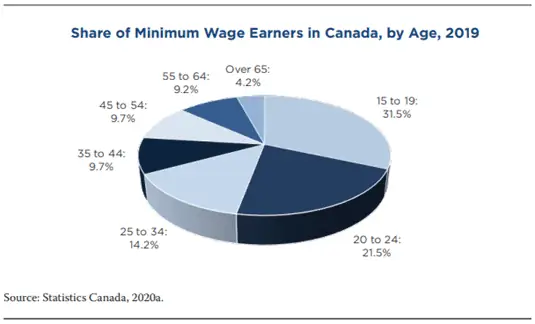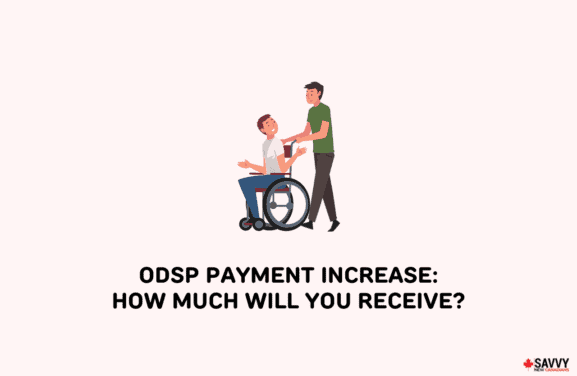A minimum wage is the lowest amount of compensation that an employer is obligated to pay workers for work performed during a given period.
In Canada, the lowest minimum wage is $14.00 per hour in the province of Saskatchewan. On the opposite end is Yukon, with $16.77 per hour, currently the highest in the country.
Meanwhile, Canada’s minimum hourly wage for the federally regulated private sector increased from $15.55 to $16.65 per hour on April 1, 2023.
The increase will help around 26,000 Canadian workers, who earn less than the current rate, keep up with inflation.
Key Takeaways
- The lowest minimum wage in Canada is $14.00 per hour in Saskatchewan.
- On April 1, 2023, Yukon increased its minimum wage from $15.70 per hour to $16.77 per hour, surpassing the $16.00 per hour in Nunavut.
- Research shows that in 2019, there were 1,420,000 minimum wage workers in Canada out of the total number of employees of 16,153,000.
What is the Lowest Minimum Wage in Canada?
Saskatchewan has the lowest minimum wage in Canada at $14.00 per hour, which became effective on October 1, 2023. It will increase to $15.00 per hour on October 1, 2024.
Minimum Wage By Province
The table below shows the current minimum wage across Canada.
| Province | Minimum Hourly Wage | Effective Date |
| Alberta | $15.00 | Effective as of October 1, 2018. |
| British Columbia | $16.75 | Effective as of June 1, 2023. |
| Manitoba | $15.30 | Effective as of October 1, 2023 |
| New Brunswick | $14.75 | Effective as of April 1, 2023. |
| Newfoundland & Labrador | $15.00 | Effective as of October 1, 2023 |
| Northwest Territories | $16.05 | Effective as of September 1, 2023 |
| Nova Scotia | $15.00 | Effective as of October 1, 2023 |
| Nunavut | $16.00 | Effective as of April 1, 2020. The minimum wage in NU is reviewed on April 1 of every year. |
| Ontario | $16.55 | Effective as of October 1, 2023 |
| Prince Edward Island | $15.00 | Effective as of October 1, 2023 |
| Quebec | $15.25 | Effective as of May 1, 2023. |
| Saskatchewan | $14.00 | Effective as of October 1, 2023 |
| Yukon | $16.77 | Effective as of April 1, 2023. |
Minimum Wage Rules and Exemptions in Canada
Minimum wage is established across all jurisdictions in Canada. The rates vary considerably throughout the country because each province and territory can set their labour legislation.
On April 1, 2023, Canada instituted a federal minimum wage of $16.65 per hour.
The rate applies to workers and interns in federally-regulated private sectors such as banks, postal and courier services, and interprovincial transportation (air, rail, road and marine).
Meanwhile, the minimum wage rates in different provinces and territories in Canada range from $14.00 per hour in Saskatchewan to $16.77 per hour in Yukon.
Below are the minimum wage rules and exemptions in some Canadian provinces.
Alberta
- Minimum hourly wage: $15.00 per hour (Effective as of June 26, 2019).
- The current Alberta minimum wage applies to most employees in the province.
- Exemptions to the minimum wage include real estate brokers, post-secondary academic staff, municipal police service members, extras in films or video productions, etc.
British Columbia
- Minimum hourly wage: $16.75 (Effective as of June 1, 2023).
- The BC minimum wage applies to all employees paid hourly and on a salary, commission or incentive basis.
- Exemptions to the minimum wage include federally regulated employees, independent contractors, licensed professionals (such as doctors, dentists, and lawyers), etc.
Manitoba
- Minimum hourly wage: $15.30 (Effective as of October 1, 2023).
- All employees (full-time and part-time) are entitled to the minimum hourly wage regardless of the number of hours they work.
- Exemptions to the minimum wage include independent contractors, self-employed persons, some agricultural workers, election workers, and professionals.
New Brunswick
- Minimum hourly wage: $14.75 (Effective as of April 1, 2023).
- All employees paid by salary, commission, and for piece work are entitled to at least minimum wage for every hour they worked. These include part-time, full-time, and casual employees.
- Exemptions to the minimum wage standards include employees under federal jurisdiction, babysitters, home care workers, construction workers employed directly by the homeowner, and independent contractors.
Newfoundland & Labrador
- Minimum hourly wage: $15.00 (Effective as of October 1, 2023).
- The Newfoundland minimum wage applies to employees paid hourly, weekly, or monthly.
Northwest Territories
- Minimum hourly wage: $16.05 (Effective as of September 1, 20230.
- The minimum wage applies to most employees who render work in the Northwest Territories.
Yukon
- Minimum hourly wage: $16.77 (Effective as of April 1, 2023).
- The minimum wage applies to most employees in Yukon, but with exceptions such as employees covered by a collective agreement, excluded by regulations (such as sitters or workers hired in private residences) and those who fall under federal jurisdiction.
What Is the Highest Minimum Wage in Canada?
Currently, the highest minimum wage in Canada is $16.77 per hour in Yukon. The rate came into effect on April 1, 2023.
How Many People Earn the Minimum Wage in Canada?
Research from the Fraser Institute (Who Earns the Minimum Wage in Canada?) shows that in 2019, there were 1,420,000 minimum wage workers in Canada out of the total number of employees of 16,153,000 (an incidence rate of 8.8%).
Data from Statistics Canada reveals that 53% of all minimum wage workers in the same period were between the ages of 15 and 24, many of whom were secondary or tertiary earners.
The percentage of minimum wage workers in the older age groups is significantly smaller, as seen in the image below.

FAQs
In Ontario, the hourly earnings an individual needs to earn to cover the cost of living in the area ranges from $18.05 in London Elgin Oxford to $23.15 in Toronto. In comparison, the Toronto minimum wage is $16.55.
The standard number of work hours in Canada is 40 hours per week or 8 hours per day. In many cases, you can work a maximum of 48 hours a week.
No law exists against having two jobs or working for more than one company. But whether or not you can do so depends on your employment contract. Even if your employer does not prohibit you from having another job, it may be vital to be forthright to ensure employer trust.
Trading Economics data reveal that the average hourly wage of permanent employees in Canada in February 2023 was $33.87. The rate increased from $33.72 per hour in January. In 2022, the average hourly wage in Canada was $31.37, reports Statista.
Related:



